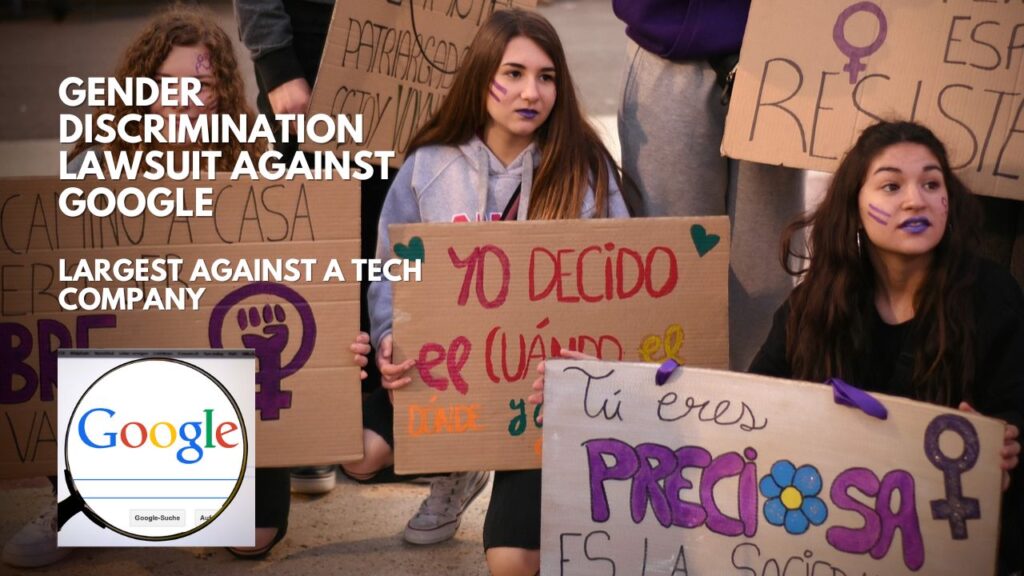
Gender Discrimination Lawsuit Against Google
Gender Discrimination Lawsuit Against Google: Largest Against A Tech Company
Google announced on July 20, 2023, that it had agreed to pay $90 million to settle a gender discrimination lawsuit filed by female employees. The lawsuit alleged that Google paid women less than men for the same work and discriminated against them in promotions.
The settlement is the largest ever reached in a gender discrimination lawsuit against a tech company. It is also the first time that Google has been found to have discriminated against its employees on the basis of gender.
The lawsuit was filed in 2017 by four female Google employees. The plaintiffs alleged that Google had a “systemic” problem with gender discrimination, and that they had been personally discriminated against as a result.
The settlement will provide financial compensation to the plaintiffs, as well as changes to Google’s policies and procedures. Google has also agreed to create a new position of “Chief Diversity Officer” and to hire an independent auditor to review its pay practices.
The settlement is a major victory for the plaintiffs and for women in the tech industry. It sends a message to other tech companies that they will be held accountable for their discriminatory practices. It also provides hope to women who have experienced gender discrimination in the workplace.

Here are some additional details about the settlement:
- The settlement will provide $60 million in cash payments to the plaintiffs.
- The remaining $30 million will be used to create a fund to support diversity and inclusion initiatives at Google.
- Google has also agreed to make changes to its pay practices, including creating a new pay equity team and conducting annual pay equity audits.
- Google has also agreed to hire an independent auditor to review its pay practices.
- The settlement is subject to court approval.
The settlement is a significant step forward for gender equality in the tech industry. It is a reminder that tech companies cannot get away with discriminating against their employees. It is also a victory for the plaintiffs, who have fought for years to hold Google accountable for its discriminatory practices.
Lawsuits against Major Companies

Let’s look at some of the gender Discrimination Lawsuits against Major Companies.
- Walmart: In 2018, Walmart agreed to pay $16 million to settle a gender discrimination lawsuit filed by female employees. The lawsuit alleged that Walmart paid women less than men for the same work and discriminated against them in promotions. [1]
- Citigroup: In 2019, Citigroup agreed to pay $55 million to settle a gender discrimination lawsuit filed by female employees. The lawsuit alleged that Citigroup paid women less than men for the same work and discriminated against them in promotions. [2]
- Goldman Sachs: In 2020, Goldman Sachs agreed to pay $5 million to settle a gender discrimination lawsuit filed by female employees. The lawsuit alleged that Goldman Sachs paid women less than men for the same work and discriminated against them in promotions. [3]
- McKinsey & Company: In 2021, McKinsey & Company agreed to pay $500 million to settle a gender discrimination lawsuit filed by female employees. The lawsuit alleged that McKinsey & Company paid women less than men for the same work and discriminated against them in promotions. [4]
- Morgan Stanley: In 2022, Morgan Stanley agreed to pay $30 million to settle a gender discrimination lawsuit filed by female employees. The lawsuit alleged that Morgan Stanley paid women less than men for the same work and discriminated against them in promotions. [5]
These are just a few examples of the many gender discrimination lawsuits that have been filed against major companies in recent years. These lawsuits highlight the ongoing problem of gender discrimination in the workplace, and they serve as a reminder that companies must be held accountable for their discriminatory practices.
Tips for Employers to Avoid Gender Discrimination Lawsuits

- Create a workplace culture that is free from discrimination. This means having clear policies and procedures in place that prohibit discrimination and harassment, and ensuring that all employees are aware of these policies. It also means creating a culture where employees feel comfortable reporting discrimination and harassment without fear of retaliation.
- Pay employees equally for equal work. This means ensuring that women and men are paid the same for doing the same job. It also means ensuring that women are not disproportionately represented in lower-paying jobs or in jobs with fewer opportunities for advancement.
- Promote women fairly. Women should be promoted based on their qualifications and performance, not on their gender. Employers should ensure that women are given the same opportunities for advancement as men.
- Create a diverse workforce. A diverse workforce is a more productive workforce. Employers should make an effort to recruit and retain a diverse workforce of women and men from all backgrounds.
- Train supervisors and managers on discrimination and harassment. Supervisors and managers should be trained on how to identify and prevent discrimination and harassment in the workplace. They should also be trained on how to handle complaints of discrimination and harassment.
- Encourage employees to report discrimination and harassment. Employees should feel comfortable reporting discrimination and harassment without fear of retaliation. Employers should have a system in place for employees to report discrimination and harassment, and they should ensure that all reports are investigated promptly and thoroughly.
By following these tips, employers can help create a workplace free from gender discrimination and avoid costly lawsuits.
In addition to the above, employers should also:
- Conduct regular pay audits to ensure that women and men are paid equally for equal work.
- Review job descriptions and performance evaluations to ensure that they are not biased against women.
- Offer flexible work arrangements to accommodate the needs of working parents, who are disproportionately women.
- Provide training and development opportunities for women to help them advance in their careers.
- Create a culture of accountability where employees are encouraged to speak up if they see or experience discrimination.
By taking these steps, employers can create a workplace that is fair and equitable for all employees, regardless of gender.
Gig Economy Jobs: The Future of Work?





